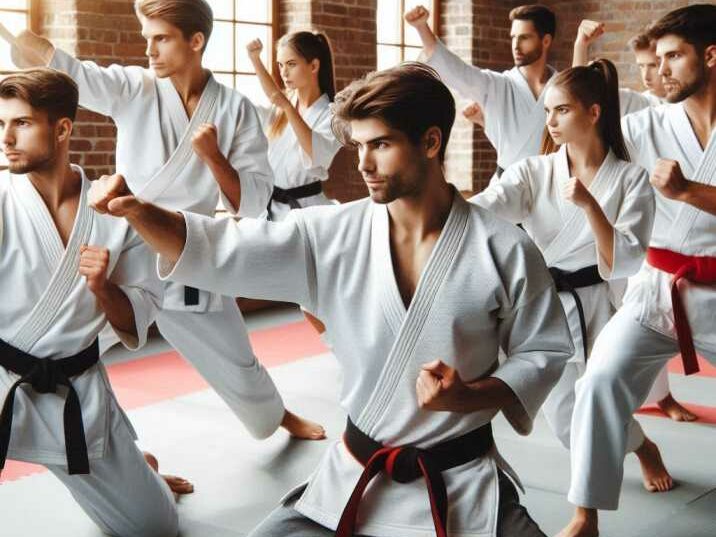Martial arts are more than just a way to defend yourself; they are a path to a better life. People from all over the world have found that practicing martial arts brings positive changes to their lives. In this article, we will explore how martial arts change your lifestyle.

Table of Contents
Table of Contents
- Introduction
- Physical Benefits of Martial Arts
- Improved Fitness
- Weight Loss
- Enhanced Flexibility
- Mental Benefits of Martial Arts
- Increased Focus
- Stress Relief
- Boosted Confidence
- Social Benefits of Martial Arts
- Building Friendships
- Learning Respect
- Community Involvement
- Lifestyle Changes Through Martial Arts
- Discipline and Routine
- Healthy Eating Habits
- Better Sleep
- FAQs
- Conclusion
Introduction
Martial arts have been practiced for centuries, and their popularity continues to grow. Many people join martial arts classes to learn self-defense, but they soon realize that the benefits go far beyond physical protection. Martial arts can improve your fitness, mental health, and social life, leading to a better lifestyle overall.
How Martial Arts Change Your Lifestyle?
Physical Benefits of Martial Arts
Improved Fitness
Martial arts involve rigorous training that includes cardio, strength, and flexibility exercises. This helps improve your overall fitness. Activities like punching, kicking, and sparring require a lot of energy and effort, which helps you get stronger and more agile.
Training sessions often include warm-ups like running or jumping jacks, followed by intense drills and exercises. These sessions work out various muscle groups, improving muscle tone and endurance. As a result, regular martial arts practice can lead to a stronger heart, better lung capacity, and improved circulation.
Moreover, the consistent physical activity helps to maintain a healthy weight and reduces the risk of chronic diseases such as heart disease, diabetes, and hypertension. Practicing martial arts can also improve your coordination and balance, making you more adept at physical activities in general.
Weight Loss
Practicing martial arts can help you lose weight. The intense workouts burn a lot of calories, and over time, you will notice a decrease in body fat. Consistent practice helps in maintaining a healthy weight.
For example, a typical hour-long session of martial arts can burn anywhere from 500 to 1000 calories, depending on the intensity of the workout and the individual’s body weight. This calorie expenditure, combined with a balanced diet, can lead to significant weight loss over time.
In addition to burning calories, martial arts can increase your metabolic rate. This means your body continues to burn calories even after you’ve finished your training session. This “afterburn” effect can be a significant advantage for those looking to lose weight.
Enhanced Flexibility
Martial arts training often includes stretching exercises that enhance flexibility. Better flexibility can prevent injuries and improve your range of motion, making everyday activities easier and more comfortable.
Stretching is an integral part of martial arts training. Before and after workouts, practitioners engage in dynamic and static stretching routines. These exercises help to lengthen and strengthen muscles, making them more pliable and less prone to injuries.
Improved flexibility also contributes to better posture and alignment. It can alleviate muscle tension and reduce the risk of joint and muscle injuries. Flexibility gained through martial arts can also enhance your performance in other physical activities, whether it’s playing sports, dancing, or simply moving more freely in your daily life.
Mental Benefits of Martial Arts
Increased Focus
Martial arts require a lot of concentration and focus. By practicing regularly, you can improve your focus and attention. This can help you in school, work, and other areas of life where concentration is important.
During martial arts training, you need to be fully present and mindful of your movements, your opponent’s actions, and your surroundings. This level of concentration helps to sharpen your mental faculties. Techniques like kata (patterns) in karate or forms in taekwondo require memorization and precision, which boost cognitive functions.
Additionally, martial arts teach you how to set goals and achieve them step by step. Whether it’s mastering a new technique or advancing to a higher belt, these achievements require perseverance and focus. The discipline learned through martial arts can translate into better performance in academic and professional settings.
Stress Relief
Many people find that martial arts are a great way to relieve stress. The physical activity helps to release tension, and the focus required can take your mind off worries and problems. This can lead to a more relaxed and peaceful state of mind.
Exercise is known to release endorphins, the body’s natural feel-good chemicals. Martial arts provide an excellent outlet for releasing built-up stress and aggression in a controlled environment. Techniques such as deep breathing, meditation, and mindfulness, often incorporated into martial arts training, can further enhance relaxation and stress reduction.
Moreover, the structured environment of martial arts classes provides a sense of order and control, which can be comforting during stressful times. The supportive community within martial arts schools also offers emotional support and camaraderie, helping to alleviate feelings of isolation and anxiety.
Boosted Confidence
Learning new skills and achieving goals in martial arts can boost your confidence. As you progress and improve, you feel better about yourself and your abilities. This increased self-esteem can positively impact other areas of your life.
Martial arts training involves overcoming challenges and pushing your limits. Whether it’s breaking a board, sparring with a partner, or mastering a difficult technique, each accomplishment builds self-assurance. As you advance through the ranks and earn higher belts, you gain a tangible sense of achievement and recognition.
This newfound confidence can spill over into your personal and professional life. You’ll find yourself more assertive, more willing to take on new challenges, and more resilient in the face of setbacks. Martial arts also teach you to respect yourself and others, which can improve your interactions and relationships.
Social Benefits of Martial Arts
Building Friendships
Joining a martial arts class gives you the chance to build friendships. You train with others who share your interests, and the teamwork required in many martial arts fosters strong bonds and camaraderie.
Martial arts classes often involve partner drills, group exercises, and sparring sessions. These activities require cooperation, trust, and mutual respect. Through these interactions, you get to know your fellow practitioners and build lasting friendships.
The sense of community in martial arts schools is strong. Many schools organize social events, competitions, and seminars, providing additional opportunities to bond with others. The shared experience of training and achieving goals together creates a supportive network of friends who encourage and motivate each other.

Learning Respect
Martial arts teach respect for others. You learn to respect your instructors, training partners, and even your opponents. This respect extends beyond the dojo and into everyday life, making you a more respectful and considerate person.
Respect is a core principle in martial arts. From bowing to your instructor and training partners to following the rules and traditions of the martial art, respect is ingrained in every aspect of training. This emphasis on respect helps to build character and ethical values.
Learning to respect others also means understanding and appreciating different perspectives and backgrounds. Martial arts schools often bring together people from diverse cultures and walks of life, promoting inclusivity and understanding. This respect for diversity can enhance your social interactions and relationships outside of the dojo.
Community Involvement
Many martial arts schools are involved in their local communities. By participating, you can become more involved in your community, meeting new people and participating in events and activities.
Martial arts schools often engage in community service, charity events, and local competitions. These activities provide opportunities to give back to the community and make a positive impact. Participating in these events helps to develop a sense of civic responsibility and pride.
Being involved in community activities also expands your social network and exposes you to new experiences and opportunities. Whether it’s volunteering at a local event, participating in a martial arts demonstration, or organizing a fundraiser, you can make meaningful contributions to your community while enhancing your social skills and connections.
Through Martial Arts Lifestyle Changes
Discipline and Routine
Martial arts instill a sense of discipline and routine. The regular training schedule helps you develop good habits and a structured daily routine. This discipline can carry over into other aspects of your life, making you more organized and responsible.
Training in martial arts requires commitment and consistency. Regular attendance and practice teach you the importance of sticking to a schedule and putting in the effort to achieve your goals. This discipline can extend to other areas of your life, such as work, school, and personal responsibilities.
The structured nature of martial arts classes also helps to develop time management skills. Balancing training with other commitments requires planning and prioritization. These skills are valuable in managing daily tasks and long-term goals.
Healthy Eating Habits
Martial arts training often emphasizes the importance of healthy eating. To perform well, you need to fuel your body with nutritious foods. This can lead to better eating habits and a healthier diet overall.
Instructors often provide guidance on nutrition and the importance of a balanced diet. Eating the right foods can enhance your performance, recovery, and overall well-being. This focus on nutrition can lead to better food choices and a more mindful approach to eating.
Understanding the connection between diet and performance can motivate you to adopt healthier eating habits. You’ll learn to appreciate the benefits of whole foods, hydration, and balanced meals. These habits can improve your energy levels, mood, and overall health.
Better Sleep
Regular physical activity, such as martial arts training, can help improve your sleep quality. You may find it easier to fall asleep and stay asleep, leading to more restful and rejuvenating nights.
Exercise is known to regulate sleep patterns and improve the quality of sleep. The physical exertion from martial arts training can help you feel more tired at the end of the day, making it easier to fall asleep. Additionally, the mental relaxation techniques learned in martial arts, such as deep breathing and meditation, can promote better sleep.
Good sleep hygiene is crucial for overall health and well-being. Improved sleep can lead to better mood, increased energy, and enhanced cognitive function. By incorporating martial arts into your routine, you can create a healthier sleep schedule and enjoy the benefits of restful nights.
Conclusion
Martial arts offer numerous benefits that can change your lifestyle for the better. From improving your physical fitness and mental health to fostering social connections and community involvement, martial arts can lead to a more fulfilling and healthier life. Whether you’re a child, teenager, or adult, there’s a martial art that’s right for you. So, why not give it a try and see how it can transform your life?
FAQs
1. Can anyone practice martial arts?
Yes, martial arts are suitable for people of all ages and fitness levels. There are different styles and levels, so you can find one that suits you.
2. How often should I train in martial arts?
It depends on your goals, but most people benefit from training 2-3 times a week. Consistency is key to seeing improvement.
3. Is martial arts safe for children?
Yes, martial arts can be very safe for children when taught by qualified instructors. It can also help kids develop discipline and confidence.
4. Do I need special equipment to start martial arts?
Most martial arts schools provide the necessary equipment for beginners. As you progress, you might need to invest in your own gear.
5. Can martial arts help with weight loss?
Yes, the physical activity involved in martial arts can help you burn calories and lose weight, especially when combined with a healthy diet.


